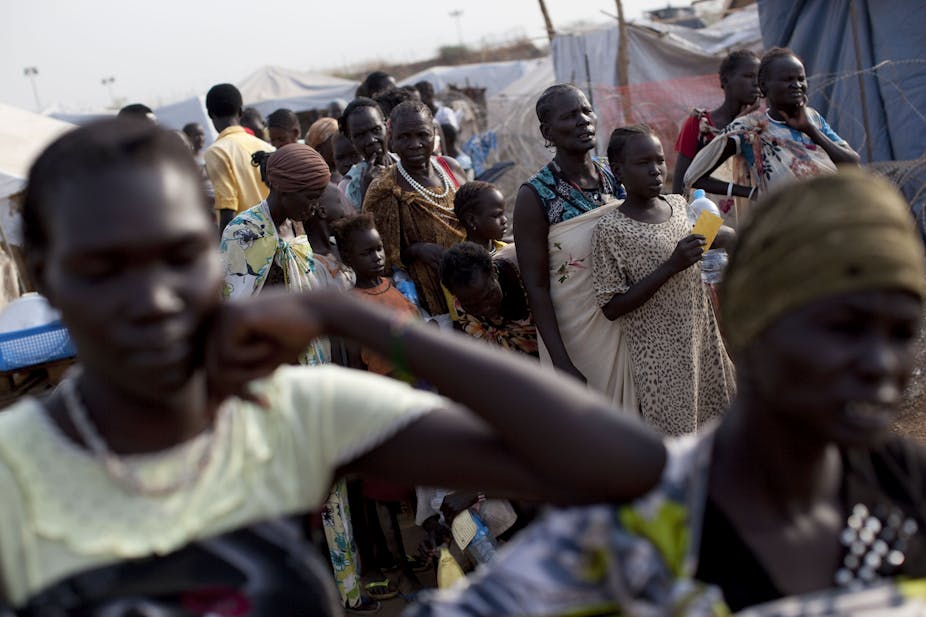Just one year after South Sudan reached its most recent peace agreement, ethnic and political divisions still plague the world’s newest nation. The most recent spell of conflict began in 2013, when President Salva Kiir accused his vice-president and longtime rival Reik Machar of plotting to overthrow him. Ever since, violence and disorder have prevailed above all attempts to stabilise the country.
As is often the case in civil conflict, it’s civilians who bear the brunt of the violence. The UN High Commissioner for Human Rights estimates that tens of thousands of civilians have been killed since the violence resumed in 2013, with more than 2m residents displaced since Machar’s alleged coup.
These are shocking figures – especially given that there is a force in place designed to protect South Sudan’s people.
The United Nations Mission in South Sudan (UNMISS) has always operated under a “protection of civilians” mandate, meaning it’s authorised to use force to protect civilians from violence. But its performance has been disappointing to say the least.
In February 2016, UNMISS troops retreated to their bases within earshot of an attack on the Malakal Protection of Civilians (PoC) site, which it was charged to protect. The violence went on for more than three hours, leaving 123 people injured and some 30 dead. An escaped humanitarian worker alerted UNMISS to the attack, but the 12,000-troop operation, costing nearly £1 billion a year, was apparently unmoved to act.
Other violence has rumbled along in the background too. Between 8 and July 8-25, 217 cases of rape were reported in the capital city of Juba alone. In the same month, the city also witnessed an attack on a PoC site in Juba. This attack predominantly targeted humanitarian aid workers.
All in all, UNMISS has too often let South Sudan’s civilians down. But things may be about to improve.
Boots on the ground
Since the July attacks, UNMISS’s mandate has been renewed and expanded, suggesting that the Security Council is trying to tackle the mission’s shortcomings. Resolution 2304 (2016) expands the operation’s military presence from 12,000 to 17,000 troops – 4,000 of whom will serve as a “regional protection force”.
The force might be likened to the Force Intervention Brigade in the Democratic Republic of the Congo, which operates under a uniquely aggressive mandate. However, unlike the brigade, which is an “intervention” force, the regional protection force in South Sudan is explicitly intended for “protection” rather than “intervention”, and will be deployed “in co-operation with” the government. Still, it is strictly mandated to promptly and effectively “engage any actor that is credibly found to be preparing attacks”.
This means it will have absolute authority to combat violence that targets civilians, regardless of the perpetrator.

The Security Council is uncommonly insistent on this point, and has made it clear it has no truck with obstructionism. In September 2016, the government of South Sudan consented to the deployment of the regional protection force, but it continues to obstruct UNMISS’s movements and has stood in the way of its activities. This has perturbed even among the most reluctant members of the Security Council, who are now openly considering putting South Sudan under an arms embargo.
It has become clear that as long as Juba continues to stand in the way of the UN’s efforts to protect South Sudanese civilians, this threat will be on the table. That the country has now agreed to the deployment is testament to the power of this threat.
This sounds incremental, but in fact, it signals real progress. For one, it reflects a growing commitment – if only at the political level – to addressing violence against civilians. More strikingly still, it indicates that even Russia and China, the Security Council’s most dogged advocates for “state sovereignty”, accept that there are limits to that defence when it comes to crimes against civilian populations.
The UN is still working with the South Sudanese government to make the force as palatable as possible, and the government will have input on where the force’s troops are drawn from. But should it continue to hamper the UN’s efforts to protect civilians, it will face consequences. The council’s primary aim is to come up with a deal acceptable to the South Sudanese government. But when asked about a Plan B, the US’s UN Ambassador Samantha Power said:
The UN Security Council resolution is itself very explicit about what Plan B will entail, and the council will have to come together and consider the steps that we’ve laid out in the resolution, which include targeted sanctions and an arms embargo.
For all that the Security Council is doing to keep the South Sudanese government on side, it seems they’re taking the protection of civilians increasingly seriously – and working hard to improve on its shameful record of inaction and ineptitude.

